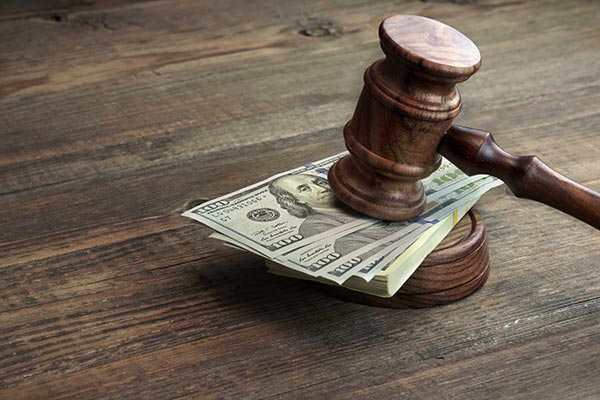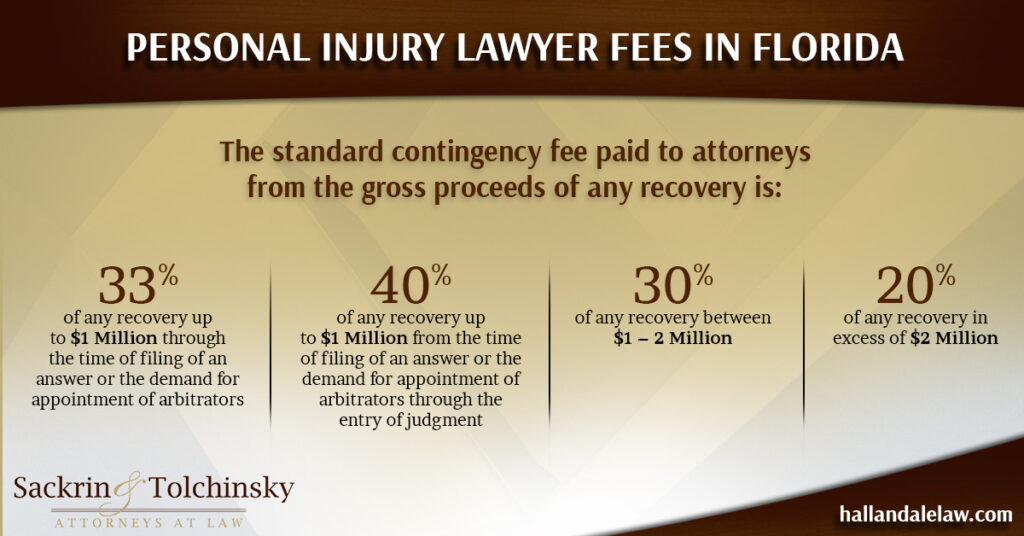typical lawyer fees for personal injury
Understanding lawyer fees for personal injury cases is crucial. These fees can vary widely.
Personal injury cases often involve complex legal processes and negotiations. Hiring a lawyer helps navigate these challenges. But many people worry about the cost. Lawyer fees can depend on several factors, such as the complexity of the case, the lawyer’s experience, and the fee structure they use.
Some lawyers charge hourly rates, while others work on a contingency basis. This means they only get paid if you win your case. Knowing what to expect can help you make an informed decision. In this blog, we will explore typical lawyer fees for personal injury cases. This will help you understand what you might pay and why.

Credit: www.sutliffstout.com
Introduction To Personal Injury Lawyer Fees
When dealing with personal injury cases, understanding lawyer fees is crucial. These fees can impact your decision to hire a lawyer. Knowing what to expect helps avoid surprises. Let’s dive into the typical lawyer fees for personal injury cases.
Importance Of Understanding Fees
Understanding fees helps you budget for legal expenses. It also allows you to compare different lawyers. Knowing the fee structure ensures you get the best value. It prevents misunderstandings and conflicts later on. Transparent fees build trust with your lawyer.
Common Fee Structures
Personal injury lawyers usually work on a contingency fee basis. This means they get paid only if you win your case. The fee is typically a percentage of your settlement. Another common structure is the hourly rate. You pay for the time the lawyer spends on your case. Some lawyers may charge a flat fee for specific services. Always ask about additional costs like court fees or expert witness fees.
Contingency Fees Explained
Understanding the costs of legal services can be confusing. One common fee structure for personal injury lawyers is the contingency fee. This method can benefit clients who may not have money upfront. Let’s break down how contingency fees work.
Percentage Taken
In a contingency fee arrangement, the lawyer takes a percentage of the settlement. This percentage varies but usually ranges from 25% to 40%. The exact percentage depends on the complexity of the case and the lawyer’s experience. Always discuss this percentage before signing any agreement.
When Fees Are Paid
Lawyers only get paid if you win the case. If you lose, you owe nothing for the lawyer’s time. This makes legal help accessible to many. Fees are typically deducted from the final settlement amount. This way, clients do not need to pay out of pocket.
Hourly Rates
Understanding lawyer fees for personal injury cases can be daunting. One common fee structure is the hourly rate. This means you pay the lawyer for each hour they work on your case.
Average Hourly Costs
The average hourly rate for a personal injury lawyer varies. It typically ranges between $100 and $500 per hour. The exact cost depends on several factors, including the lawyer’s experience and location.
Factors Influencing Rates
Experience is a key factor. More experienced lawyers usually charge higher rates. A lawyer with many years of experience can demand a higher fee.
Location also impacts the hourly rate. Lawyers in big cities often charge more than those in smaller towns. The cost of living in a particular area can affect lawyer fees.
The complexity of your case can influence the rate too. Cases that require more time and effort might result in higher fees. Simple cases might cost less.
Reputation plays a role as well. A lawyer with a strong track record may charge more. Their success rate can justify higher fees.
Lastly, the demand for legal services affects hourly rates. High demand can lead to higher costs. Low demand might mean lower fees.
Flat Fees For Services
Flat fees for services can simplify the billing process in personal injury cases. With flat fees, clients know upfront what they will pay for specific legal services. This can reduce anxiety and help with financial planning. Flat fees are not hourly rates; instead, they are set prices for particular tasks or services.
Typical Flat Fee Services
Lawyers often use flat fees for simple tasks. This can include filing documents, drafting letters, or initial consultations. These services are straightforward and predictable. Thus, they can be priced easily.
Pros And Cons
Flat fees offer many benefits. Clients know the cost upfront. This helps them budget and avoids surprise bills. It also makes legal costs more transparent. The lawyer gets paid for their work without tracking hours.
There are some downsides too. Not all legal tasks fit into flat fees. Complex cases may need more work than expected. This can lead to higher costs later. Lawyers might also be less flexible with flat fees. They may not adjust prices based on the case’s unique needs.
Retainer Fees
Personal injury cases often require hiring a lawyer. Lawyers usually charge fees for their services. One common type of fee is the retainer fee. Retainer fees are upfront payments made to secure a lawyer’s services.
How Retainer Fees Work
Retainer fees work as a down payment for a lawyer’s services. This fee ensures the lawyer will work on your case. The lawyer places the retainer fee in a special account. As the lawyer works on your case, they deduct their fees from this account.
If the retainer runs out, the lawyer may ask for more money. The remaining balance of the retainer is returned if the case ends early. Retainer fees provide a way to manage legal costs upfront.
Common Retainer Amounts
Retainer amounts can vary depending on the lawyer and the case. For personal injury cases, retainer fees often range from $2,000 to $5,000. Some lawyers may charge more or less based on their experience.
Complex cases may require higher retainer fees. Simple cases may have lower fees. Always discuss retainer fees with your lawyer before hiring them. Knowing the cost upfront helps you budget for your legal expenses.

Credit: kuvaralawfirm.com
Additional Costs And Expenses
Personal injury cases often involve more than just lawyer fees. There are additional costs and expenses that you need to consider. These costs can add up quickly and impact your overall budget. It is crucial to understand these expenses to avoid any surprises.
Court Fees
Court fees are one of the most common expenses in personal injury cases. These fees are mandatory and required to file your case. They include filing fees, service fees, and costs for court reporters. Each court has its own fee structure. Check with your local court for specific amounts.
Expert Witness Fees
Expert witnesses provide crucial testimony in personal injury cases. Their expertise can strengthen your case. However, they do not come cheap. Expert witnesses charge for their time and knowledge. Fees can vary based on the expert’s field and experience. Be prepared to cover these costs.
Negotiating Lawyer Fees
Personal injury cases can be stressful. The cost of legal representation adds to this stress. Negotiating lawyer fees is a key step. It helps ensure you get the best deal possible. Understanding how to negotiate effectively can save you money.
Tips For Negotiation
- Do Your Research: Know the average fees in your area.
- Ask for a Detailed Breakdown: Get a clear list of charges.
- Compare Different Lawyers: Look at more than one option.
- Be Honest About Your Budget: Transparency helps in finding a middle ground.
- Negotiate the Contingency Fee: Often, personal injury lawyers work on a contingency basis. Try to negotiate this percentage.
When To Seek A Different Lawyer
If a lawyer is not willing to negotiate, it may be a red flag. Here are some situations when you should consider looking for a different lawyer:
- High Initial Costs: If the upfront costs are too high, it might not be worth it.
- Lack of Transparency: If the lawyer is not clear about their fees, seek another option.
- No Flexibility: If they are unwilling to adjust their fees, find someone more flexible.
- Negative Reviews: Check online reviews. If there are many complaints about fees, consider other options.
Remember, you have the right to a fair fee structure. Don’t be afraid to negotiate or look for a different lawyer if needed.

Credit: www.hallandalelaw.com
Finding Affordable Legal Representation
Finding affordable legal representation can be challenging, especially for personal injury cases. Many people worry about the cost of hiring a lawyer. Fortunately, there are several options to explore that can help you get the legal help you need without breaking the bank.
Pro Bono Services
Pro bono services are a great way to find affordable legal representation. Many lawyers offer free services to clients who can’t afford to pay. These services are often provided by lawyers who want to give back to the community.
How to Find Pro Bono Services:
- Contact your local bar association.
- Check with law schools for clinics.
- Search online directories for pro bono lawyers.
Legal Aid Resources
Legal aid resources can also help you find affordable legal representation. These resources are often funded by the government or non-profit organizations. They aim to provide legal help to those who can’t afford it.
Types of Legal Aid Resources:
| Resource | Description |
|---|---|
| Legal Aid Societies | Organizations offering free legal help. |
| Non-Profit Organizations | Groups providing low-cost legal services. |
| Government Programs | Programs that assist with legal fees. |
Utilize these resources to find a lawyer who fits your budget. Don’t let the fear of high fees stop you from seeking justice.
Frequently Asked Questions
What Are Common Lawyer Fees For Personal Injury?
Personal injury lawyers typically charge a contingency fee. This fee is usually between 33% to 40% of the settlement. Some lawyers might also charge additional costs for case-related expenses.
Do Personal Injury Lawyers Charge Upfront Fees?
Most personal injury lawyers do not charge upfront fees. They work on a contingency fee basis, getting paid only if you win the case.
How Is The Contingency Fee Calculated?
The contingency fee is a percentage of your settlement or court award. It usually ranges from 33% to 40%, depending on the agreement.
Are There Any Additional Costs Involved?
Yes, there can be additional costs. These might include court filing fees, medical record retrieval costs, and expert witness fees. Always discuss these potential costs with your lawyer upfront.
Conclusion
Understanding typical lawyer fees for personal injury cases is crucial. It helps you plan financially. Always discuss fees with your lawyer upfront. This ensures no surprises later. Remember, many personal injury lawyers work on contingency. They get paid only if you win.
This reduces your financial risk. Be informed, ask questions, and choose wisely. Your case deserves the best representation. With this knowledge, you can navigate legal costs more confidently.

Leave a Reply